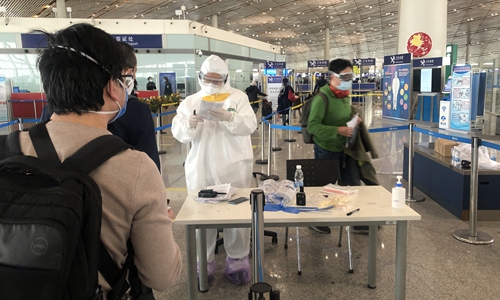HOME >> CHINA
Beijing cuts infection channels from abroad
By Liu Caiyu Source:Global Times Published: 2020/3/19 22:22:45
Flights diverted, foreigner flouting quarantine rules evicted from capital

International passengers line up at a distance of 1 meter between each other when handing in the health declaration cards at the Beijing Capital International Airport on Sunday. Photo: Liu Xin/GT
With more than 200,000 infections across the globe, Beijing, as a hotspot for international communications and the political center of China, is threatened by the spike of COVID-19 cases from overseas, leading the municipal government to further tighten management measures for overseas personnel entering Beijing starting from Thursday.Imported cases have become the main challenge of epidemic prevention and control work in Beijing, which has 34 percent of the nation's imported cases - the highest of all, Pang Xinghuo from the Beijing Centers for Diseases Control and Prevention (CDC) said at Thursday's press conference.
On Wednesday alone, Beijing reported 21 imported cases, roughly one-third of all 64 imported infections so far in the city.
To curb imported cases in Beijing is a critical task because if the epidemic resurrects in the capital, it would exert a direct impact on international exchanges and political meetings such as the "two sessions," the annual meetings of China's top legislative body and top political consultative body, analysts said.
The Beijing municipal government announced that starting Thursday, all people entering Beijing from overseas are to be transferred to designated quarantine venues for 14 days. They must pay the bills themselves.
People who live alone are not allowed to take home quarantine except some special cases such as minors, the elderly, and people with underlying conditions. The Beijing government said it won't accept such applications for home quarantine from Thursday.
Those overseas returnees who enter Beijing from other Chinese cities should report to the local communities or their employers in advance and the Beijing quarantine measures will also apply to them upon arrival.
The new announcement on Thursday has closed a loophole in the previous policy as some people did not observe home quarantine and communities' management.
A Chinese-Australian woman was told to leave the country for flouting quarantine rules and the Beijing Public Security Bureau decided to cancel the woman's working residence permit. The woman was found jogging in her community a day after she reached Beijing on March 14 without wearing a mask. The deportation decision instantly won sweeping applause among Chinese netizens.
Chinese government is taking resolute measures against those failing to follow the quarantine rules or concealing their health status, in a bid to curb the inflow of imported cases, especially in the capital Beijing, Zhi Zhenfeng, a legal expert at the Chinese Academy of Social Sciences in Beijing, told the Global Times.
As the first gateway safeguarding the capital, the Beijing Capital International Airport is facing mounting pressure from growing numbers of inbound passengers. Since February 29, 2,417 people with suspicious symptoms have been transferred to medical institutions after being screened by the airport customs, 127 per day on average. The number peaked on Wednesday with 479 people, according to the Beijing CDC on Thursday.
Some overseas flights with Beijing as their destination will be diverted to other Chinese cities surrounding Beijing, including Tianjin, Hohhot and Taiyuan, according to an aviation regulator's internal document obtained by the Global Times. Authorities released some of the new arrangement starting from Friday, which may reduce the capital's pressure as most of the 64 imported cases transited in Beijing to other Chinese cities.
Given Beijing's special status in China and the world, the government will take every effort to control the source of infection to the greatest extent and cut off the transmission channel from abroad, said Zhuang Deshui, deputy director of the Research Center for Government Integrity-Building at Peking University.
Academic training and international meetings in Beijing usually come after the Spring Festival. "The already postponed 'two sessions' could face further delay if the epidemic situation in Beijing cannot be controlled in a timely manner," Zhuang noted.
Imported cases usually have stronger infectivity as they are the first-generation cases in many overseas countries. Many infected patients have no symptoms but are still contagious, Zhong Nanshan, the top Chinese respiratory scientist, had warned on Wednesday, suggesting to directly use nucleic acid testing method on those people.
In order to precisely manage those arriving in Beijing from outside the Chinese mainland, the Beijing Capital International Airport itself has also adopted a series of "closed-loop" measures that have passengers screened in designated channels and dispatch them on designated buses to designated quarantine places.
Wendy Yang, a Beijing resident who returned to the capital from Spain on March 15 due to the expanding epidemic in Europe, told the Global Times that incoming passengers need to file a health declaration before they are allowed to enter the quarantine route where they would have their body temperatures checked.
Yang was later taken to China International Exhibition Center, less than 6 kilometers away from the airport, by a government bus for registration and were re-examined there. Those who were found to be normal at the exhibition center will be escorted by their own city government personnel to airports or train stations to continue their journeys, or sent to a designated hotel in Beijing for a 14-day quarantine.
People having infection symptoms will be transferred to Beijing Ditan Hospital for a nucleic acid test. Ditan hospital has screened at least 1,600 passengers in the 18 days up to Tuesday morning, reports said.
In preparation for a growing number of imported cases in the capital, Beijing Xiaotangshan Hospital, which was at the center of SARS treatment in 2003, reopened on March 16 after a lapse of 17 years.
Posted in: SOCIETY